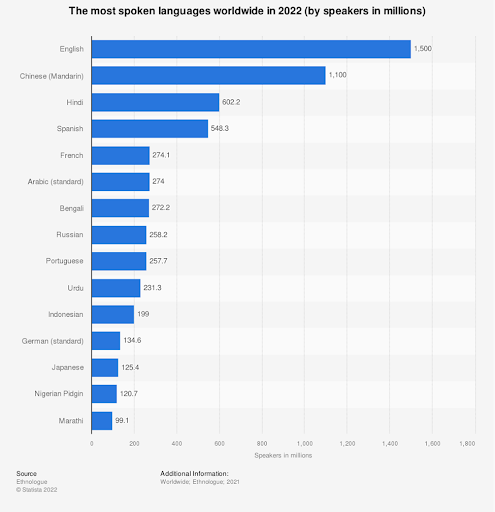The Difference between Brazilian and European Portuguese Translation
Despite speaking the same language, the Portuguese and Brazilians do not share the same Portuguese.
Brazilian and Portugal Portuguese are both varieties of the same language, and while they have some features in common, they also differ significantly from one another due to their respective histories and cultural influences.
Portuguese is one of the top 10 most spoken languages around the world. It’s completely justifiable why you might be planning to expand into Portuguese-speaking markets and consider Portuguese translation. However, you might be confused as to which Portuguese to translate, whether there are key distinctions between them, or if they share a common understanding. In this article, we get down to all things Portuguese translation for more confident decision-making.
Portuguese Translation: A Quick Overview of Portuguese
The Indo-European language family, which includes Portuguese, has its roots in the Iberian Peninsula of Europe. Portuguese is a western Romance language. It is the official language [1] of Portugal, Brazil, Cape Verde, Angola, Mozambique, Guinea-Bissau, Soto and Principe, East Timor, Equatorial Guinea, and Macau, all have it as their official language.

In the medieval Kingdom of Galicia and the County of Portugal, the Ibero-Romance language of Portuguese developed from many dialects of Vulgar Latin and still incorporates some Celtic phonology into its vocabulary.
The modern Portuguese language emerged from Galician-Portuguese in the Iberian Peninsula and is nearly identical to Galician, which is still spoken in Northwestern Spain. This Romance language arose almost 2,000 years ago, when Roman soldiers came to the peninsula in 216 BCE speaking colloquial Latin, and it grew from there, like with all Romance languages.
Portuguese is the ninth most widely [1] spoken language in the world, behind English, Chinese, Hindi, Spanish, French, Arabic, Bengali, and Russian.

There are two types of Portuguese: Brazilian (spoken in Brazil) and European (spoken in many countries in Europe, including Portugal). While they share some characteristics, there are significant variances in intonation, pronunciation, syntax, and vocabulary. But first, let’s tackle why Portuguese translation is important.
Why Portuguese Translation Is In High Demand?
If you’ve been considering having your brand’s material translated into European or Brazilian Portuguese in order to reach the Portuguese market, you probably did the math to determine whether the expense would be justified. Here are some reasons why translating your content into Portuguese could be the best thing you’ve ever done for your business:
- 76% prefer to buy a product or a service if the information is available in their own language. (CSA Research)
- 82% are less likely to buy a product or a service online if the website is not in their native language, according to the European Commission.
- Portuguese is the 5th most spoken language on the internet.
- Portuguese is the sixth most useful language for business around the world, according to Bloomberg Rankings.
- Portuguese-speaking countries have a total of approximately 274 million speakers.
- These markets are experiencing significant social and economic development. In 2018, it was revealed that Portuguese-speaking markets represent 4,3% of the world GDP and are responsible for 2% of international trade
It’s obvious how Portuguese-speaking countries are a huge potential growth market to transform your business. A promising market that can further grow and can help you drive massive growth and revenue for your business. However, one thing that can become a major roadblock to your expansion ambition is the language barrier.
While your business might be conscious of the importance of integrating Portuguese translation into your expansion plan, the choice between Brazilian and European Portuguese can leave you scratching your head. Read on to discover the differences and choose the right Portuguese for your next Portuguese translation project.
Differences Between Brazilian Portuguese and European Portuguese Translation
The main differences between Brazilian Portuguese and European Portuguese are as follows:
Formal vs. Informal Speech
In European Portuguese, the pronoun vo, meaning “you, represents an intermediate degree of formality. However, vo has all but disappeared from common speech in a few Brazilian states, including Rio Grande do Sul and Par. Due to the popularity of media goods from the Southeast, vo has become the preferred pronoun for the second person singular in writing and multimedia communications. The usage of tu, however, has increased since the turn of the century, particularly among young people in Rio de Janeiro, the country’s main cultural hub. The more formal of the two languages is Portuguese as it is used in Portugal. And in less formal situations, using vo may alienate your target audience because it is considered somewhat vulgar in Portugal. It is because of that, it’s essential to hire a translation agency that relies on in-country, native-speaking translators to translate into the right Portuguese in order to prevent offending your target audience by using the incorrect pronoun.
Pronunciation
Between these two dialects, there are a lot of pronunciation distinctions. The main distinction is that Brazilians pronounce their vowels openly, whereas Europeans pronounce their vowels in a closed or reduced manner. For instance, a Portuguese speaker would pronounce telephone more like “tlefone“, dropping the initial “e” sound with a closed mouth, as opposed to a Brazilian who might emphasize each syllable openly and more clearly. In addition, the Portuguese and Brazilian pronunciations of the last consonant “s” are “sh” and “ss” respectively. Brazilians pronounce the letter “L” differently from English speakers, using a vowel sound, /u/, instead of the English “L.” When asked where they are from, a Brazilian will most likely respond with Brásiu rather than Brazil.
Spelling
In 2009, a deal was reached to largely harmonize the spelling of the two varieties of Portuguese. As a result, European Portuguese spelling lost its silent consonants. For instance, baptismo became batismo even though that is how it was originally spelt and pronounced. Although the goal of this agreement was to facilitate cross-continent translation for the Portuguese-speaking market, any localization specialist will tell you that there are still differences to be aware of.
Brazil retained the silent “p,” but Portugal did not, therefore a term like “reception” became recep in Brazil as opposed to rece in Portugal. With these variations, you’ll see why it’s crucial to work with native translators who are proficient in the orthography of the language of your target Portuguese speakers.
Grammar
The two dialects can be distinguished by grammatical differences. The placement of pronouns is one of a sentence’s most noticeable features.Pronouns precede the verb in Brazilian Portuguese, but not in European Portuguese. Personal pronouns are nearly completely superfluous in Portuguese because verbs are conjugated differently depending on the subject of the phrase, despite the fact that they are far more common in European Portuguese.This and other more countless subtle grammatical variations across the dialects is what makes it essential for you to team up with a Portuguese translation team. They should be speaking the Portuguese dialect that you intend to use. Only then, they can make your text sound more regional and be capable of providing expert Portuguese translation services for more targeted content for your intended audience.
Vocabulary
Another area where Brazilian Portuguese and European Portuguese differ greatly is vocabulary. This can be ascribed to the fact that Brazil was colonized by Portugal more recently than other parts of South America (such as Peru and Chile).As Brazilian Portuguese evolved, many words from native tongues were incorporated, resulting in the development of a unique vocabulary. For instance, when speaking Portuguese, Brazilians pronounce computador rather than computer. The words refrigerator and air conditioner, for instance, are changed to geladeira and ar-condicionado, respectively. Brazilian Portuguese and European Portuguese have very different lexicons, particularly when it comes to neologisms. Over time, Brazilian Portuguese has incorporated and altered English words into its native tongue. Brazilian Portuguese words like tiempo, trem, and esporte sound quite close to their English equivalents while having a different spelling and having nothing to do with the words from the European Portuguese language.
Here are some more examples:
| English | Brazilian Portuguese | European Portuguese |
| Reception | recep | rece |
| Media (mass media) | mÃdia | media |
| Bus | nibus | autocarro |
| Ice cream | sorvete | gelado |
| Cup | xcara | chvena |
| Fitness club, gym | Academia (de ginstica) | ginsio, clube de fitness |
| Hello (answering the phone) | al | Estou, est l, sim, estou sim |
Brazilian and European Portuguese: Cultural differences
Now apart from the linguistic variations between Brazilian and European Portuguese, there are indeed cultural differences that make it challenging when addressing either of them.
At first glance, it may seem like they do share some common ground, especially in cuisine and architecture. That’s due to the influence of the Portuguese culture on Brazilians. However, it seems now that the Brazilian culture has its influences on the Portugues, with Brazilian soap operas and music being widely popular in Portugal.
What’s more, Brazilian culture is extremely energetic and flashy, whereas European culture is more conventional. And this is evident in their speech, attire, and social interactions. Brazilians usually use casual language, whereas Europeans typically use formal language when speaking to someone they know well.
Choosing Between Brazilian and European Portuguese Translation
So where should you start? Due to the aforementioned differences, the majority of the Portuguese translation text will be understandable when read by a speaker of one type but will sound weird or out of place by a speaker of the other. These distinctions could occasionally result in a breakdown in communication. For the purposes of localization, they should be regarded as independent languages.We are frequently asked, “How can I determine which dialect of Portuguese translation will perform best for my target market?”. What should come first is: which is your target market? Brazil, for instance, has the second-largest economy in the Americas and the tenth-largest eCommerce market in the world. It also has the most Portuguese speakers of any nation. Because of this, most businesses localize their content and communications into Brazilian Portuguese.
But, if you already where your target market is going to be, follow this general rule: if you are conducting business in Portugal, your content should be translated into European Portuguese. But, if you are planning to operate in Brazil, it should be Brazilian Portuguese then.
Understanding where your target audience is is crucial. Given that there are many differences between these two languages, having the appropriate version of Portuguese guarantees that your target market can fully understand and engage with your content.
However if your audience is not from Brazil or Portugal, and you are thinking about targeting Portuguese-speaking audiences in the Americas, Brazilian Portuguese will be the most appropriate.
Conclusion
This discrepancy can seem minor to someone who is not familiar with the language, but any Brazilian Portuguese translator will tell you that localizing and translating for their nation differs significantly from doing so in European Portuguese translation. It is crucial to use an agency that hires local translators for the dialect you have chosen to translate into in order to avoid offending anyone by using the wrong pronoun, for instance, or cultural references that won’t click with your audience. Only the most accomplished Portuguese translation team will be able to communicate with the diverse audiences that make up the Portuguese-speaking world. And that is Laoret. Whatever dialect of this beautiful language you choose to use, you can be confident that with time and effort, you will soon be communicating like a native with our translators! Contact Laoret now and request a quote to get started on your translation and localizing journey!






